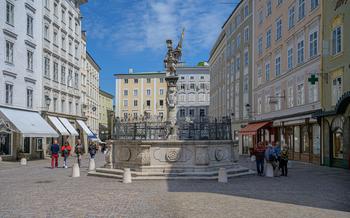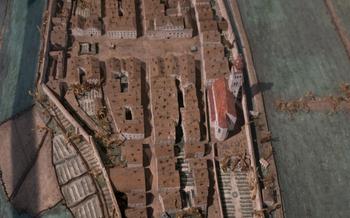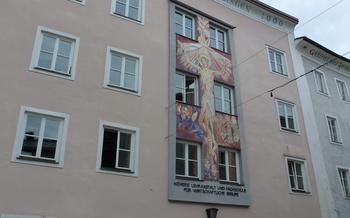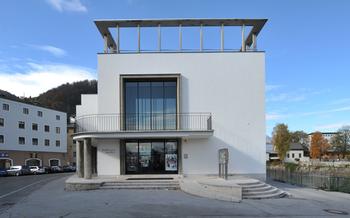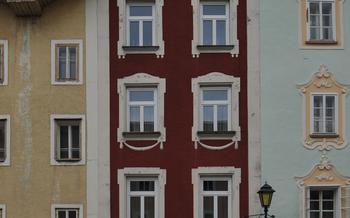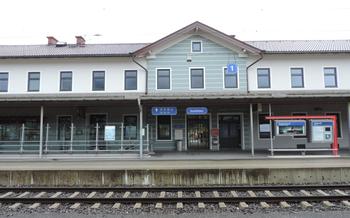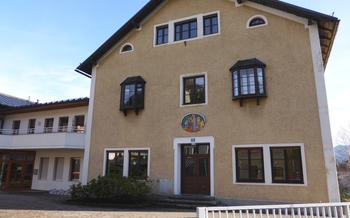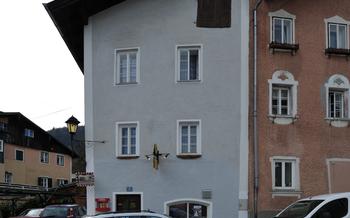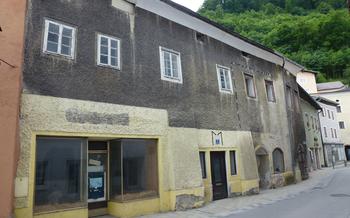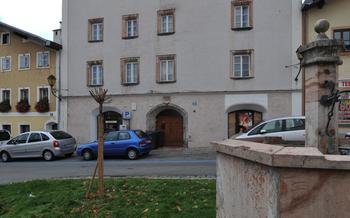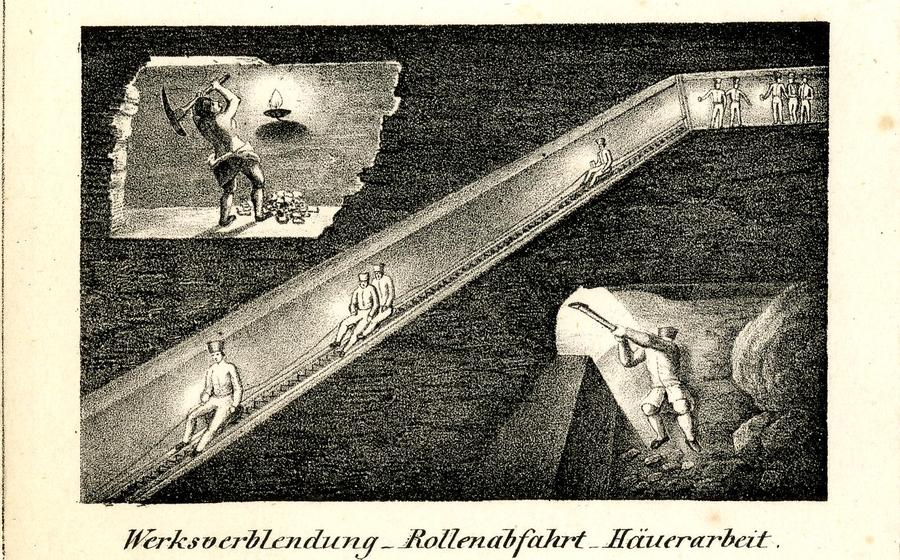
Bad Dürrnberg Salt Mine Slide
- History of the Salt Mine
- The Celtic Village
- The Salt Mine Tour
- The Mining Museum
- The Miners' Chapel: A Sacred Haven Deep Underground
- The Underground Lake
- The Salt Shop
- The Mining Village
- The Surrounding Area
- Accessibility
- Sustainability
- Insider Tip
History of the Salt Mine
In the heart of the Austrian Alps, nestled in the picturesque town of Hallein, lies the Bad Dürrnberg Salt Mine, a testament to the region's rich mining history. For over 7,000 years, salt has been extracted from these ancient tunnels, making it one of the oldest salt mines in the world. The Celts, who inhabited the area during the Iron Age, were the first to recognize the value of this precious resource. They ingeniously devised techniques to extract salt from the brine springs that flowed through the mountain. Over time, the mining operations expanded, and the salt mine became a vital economic hub, supplying salt to the surrounding regions and beyond. The cultural and economic significance of salt in Hallein's history cannot be overstated; it was a commodity that shaped the lives of its people and played a pivotal role in the development of the town.
The Celtic Village
During mining operations in the Bad Dürrnberg Salt Mine, a remarkable discovery was made - a well-preserved Celtic village dating back to the 4th century BC. This unexpected find provided valuable insights into the lives of the ancient Celts who inhabited the region.
The village, consisting of several huts and workshops, offered a glimpse into the daily lives and customs of the Celtic community. Tools, pottery, and jewelry unearthed at the site showcased their craftsmanship and artistic skills. The presence of imported goods indicated their trading connections with neighboring regions.
The discovery of the Celtic village holds immense significance for understanding the Celtic culture and its influence on the region's history. It serves as a tangible reminder of the rich cultural heritage that existed long before the advent of salt mining in Hallein.
The Salt Mine Tour
The Bad Dürrnberg Salt Mine offers guided tours for visitors to explore the depths of the mine and learn about its history and significance. The tours are led by experienced guides who provide insights into the mining operations, the cultural heritage, and the natural wonders of the mine.
The tour begins with a train ride that takes visitors deep into the mine, passing through narrow tunnels and fascinating rock formations. Along the way, the guide shares stories and legends about the miners and their work. Visitors can also see the original mining tools and equipment that were used in the past.
One of the highlights of the tour is the visit to the underground lake, a stunning natural wonder located deep within the mine. Visitors can take a boat ride on the lake, enjoying the tranquil atmosphere and the unique views of the crystal-clear water.
Another highlight is the miners' chapel, a small and intimate chapel located deep inside the mine. The chapel was built by the miners as a place of worship and reflection, and it is a testament to their faith and devotion. Visitors can admire the beautiful frescoes and carvings that decorate the chapel and learn about its significance to the mining community.
The tour also includes visits to other areas of the mine, such as the salt chambers, the mining tunnels, and the salt processing plant. Visitors can learn about the different methods of salt extraction that have been used throughout history, and they can see the modern machinery that is used to extract and process the salt today.
The salt mine tour is a unique and unforgettable experience that offers visitors a glimpse into the world of salt mining and its cultural and historical significance. It is a must-see attraction for anyone visiting the Hallein region of Austria.
The Mining Museum
The Bad Dürrnberg Salt Mine is home to a fascinating Mining Museum, which offers visitors a comprehensive insight into the history, technology, and cultural significance of salt mining in the region. Established to preserve and showcase the rich mining heritage, the museum features a range of exhibits that highlight the different methods of salt extraction used throughout history. Visitors can explore interactive displays and engage in hands-on activities that provide a deeper understanding of the challenges and ingenuity involved in the mining process. The museum plays a crucial role in educating the public about the importance of salt mining to the region's economy and culture, ensuring that the legacy of this ancient industry continues to live on.
The Miners' Chapel: A Sacred Haven Deep Underground
In the heart of the Bad Dürrnberg Salt Mine, nestled deep beneath the surface, lies a unique and sacred space – the Miners' Chapel. This remarkable chapel, carved into the rock by the miners themselves, stands as a testament to their faith and devotion. Built in the 17th century, the chapel served as a place of solace and spiritual refuge for the miners who toiled in the darkness and faced the perils of the mine.
The Miners' Chapel is a marvel of engineering and artistry. Its walls are adorned with intricate carvings and paintings depicting scenes from the Bible and the lives of the miners. The altar, carved from salt rock, is a masterpiece of craftsmanship, showcasing the skill and artistry of the miners. The chapel also features a unique wooden sculpture of Saint Barbara, the patron saint of miners, who is revered for her protection and guidance.
For the miners, the chapel was more than just a place of worship. It was a place where they could come together as a community, find strength and comfort in their faith, and pray for safety and protection. The chapel fostered a sense of camaraderie and unity among the miners, who shared a common bond of danger and hardship. It was a place where they could find solace and renewal, amidst the darkness and isolation of the mine.
Today, the Miners' Chapel remains an important symbol of the rich mining heritage of the Bad Dürrnberg Salt Mine. Visitors to the mine can step into this sacred space and experience the profound spirituality and devotion of the miners who worked in these depths. The chapel serves as a reminder of the importance of faith, community, and the human spirit in the face of adversity.
The Underground Lake
During the mining operations, an unexpected and breathtaking discovery was made: a subterranean lake hidden deep within the heart of the mine. This natural wonder, known as the Underground Lake, is a sight to behold. Its crystal-clear waters, illuminated by the soft glow of the mine's lights, create an ethereal and magical atmosphere. Visitors can embark on a boat tour of the lake, gliding through the serene waters and marveling at the intricate rock formations that surround them. The Underground Lake is a testament to the beauty and diversity of the natural world, offering a unique and unforgettable experience for visitors to the Bad Dürrnberg Salt Mine.
The Salt Shop
At the end of your visit to the Bad Dürrnberg Salt Mine, be sure to stop by the salt shop to purchase a variety of salt products, including table salt, bath salts, and souvenirs. This is a great opportunity to take home a unique gift or memento from your visit. The shop offers a wide range of salt products to suit your needs, whether you are looking for a practical kitchen item or a luxurious bath soak. The salt shop also supports local businesses and helps to preserve the mining heritage of the region.
When choosing salt products, it is important to consider the different types of salt available and their intended use. Table salt is the most common type of salt and is used for everyday cooking and seasoning. Sea salt is a natural salt that is harvested from seawater and contains trace minerals. It is often used as a finishing salt or for cooking dishes that require a more intense flavor. Bath salts are specially formulated to dissolve in water and release minerals and essential oils that can help to soothe and relax the body.
The Bad Dürrnberg Salt Mine shop offers a variety of salt products to suit every need and budget. Whether you are looking for a practical gift or a special treat for yourself, you are sure to find something to your liking.
The Mining Village
Dürrnberg, a mining village steeped in history, lies at the foot of the Untersberg mountain, where the Bad Dürrnberg Salt Mine is located. Its existence is inextricably linked to the salt mine, which has shaped the village's culture, economy, and way of life for centuries.
The village's traditional architecture reflects its mining heritage, with charming wooden houses and narrow cobblestone streets. Many of the buildings date back to the 16th and 17th centuries, when salt mining was at its peak.
The villagers of Dürrnberg have a strong sense of community and pride in their mining heritage. Many families have been involved in salt mining for generations, passing down their knowledge and skills from father to son.
Visitors to Dürrnberg can immerse themselves in the village's mining culture by visiting the Mining Museum, which showcases the history and technology of salt mining in the region. The museum houses a collection of mining tools, machinery, and artifacts, providing a glimpse into the lives of the miners who worked in the salt mine.
Exploring Dürrnberg and interacting with the local community offers a unique opportunity to learn about the rich mining heritage of the Tennengau region and to experience the warm hospitality of the villagers.
The Surrounding Area
The Bad Dürrnberg Salt Mine is nestled in the heart of the Tennengau region, a picturesque area known for its natural beauty and rich cultural heritage. Surrounded by the majestic Alps, the region offers a diverse range of outdoor activities for adventure enthusiasts. Explore the scenic hiking trails that wind through lush forests and lead to breathtaking viewpoints. Embark on a leisurely bike ride along the Salzach River, taking in the tranquil scenery and charming villages along the way. In the winter months, the region transforms into a snowy paradise, inviting skiers and snowboarders to hit the slopes of the nearby ski resorts.
Beyond the natural wonders, the Tennengau region is home to a wealth of cultural attractions. Visit the historic town of Hallein, with its well-preserved medieval center and the Hallein Castle, which houses the Keltenmuseum, dedicated to the Celtic heritage of the region. Discover the fascinating history of salt production at the Hallein Salt Museum, which showcases exhibits on the mining techniques and cultural significance of salt. Immerse yourself in the region's artistic traditions at the Museum der Moderne Salzburg, which features a diverse collection of modern and contemporary art.
Accessibility
The Bad Dürrnberg Salt Mine is committed to ensuring that all visitors, including those with disabilities, can enjoy a safe and memorable experience. The mine is wheelchair accessible, and special tours and accommodations are available for visitors with specific needs. Visitors with disabilities are encouraged to contact the mine in advance to discuss their needs and make arrangements for a personalized tour.
Special tours for visitors with disabilities are available upon request. These tours are led by trained guides who are familiar with the needs of visitors with disabilities and can provide assistance throughout the tour. The tours can be customized to accommodate the specific needs of each visitor, such as providing additional time for rest stops or using sign language interpretation.
The salt mine also offers a number of other accommodations for visitors with disabilities. These include:
- Wheelchair-accessible ramps and elevators
- Braille signage
- Audio guides for visitors with visual impairments
- Rest areas with seating
- Accessible restrooms
With these accommodations in place, the Bad Dürrnberg Salt Mine is a welcoming and accessible destination for visitors of all abilities.
Sustainability
The Bad Dürrnberg Salt Mine is committed to sustainability and environmental protection. The mine operates using renewable energy sources and has implemented measures to minimize the environmental impact of its operations. Educational programs are offered to raise awareness about the importance of sustainability, and visitors are encouraged to travel and explore the mine in a sustainable way. For example, visitors are encouraged to use public transportation or carpool to get to the mine, and to bring their own reusable water bottles and snacks to reduce waste. The mine also offers a variety of recycling and composting programs to help reduce its environmental footprint.
Insider Tip
Beyond the guided tours and well-known attractions, the Bad Dürrnberg Salt Mine holds a secret spot that adds an extra layer of enchantment to your visit. Hidden deep within the mine's tunnels, you'll find a secluded chamber known as the "Crystal Grotto." This enchanting space is adorned with shimmering salt crystals that sparkle and reflect the light, creating a mesmerizing display. To reach the Crystal Grotto, embark on a short but adventurous off-the-beaten-path trail that leads you through narrow passages and past ancient mining equipment. The reward at the end of this hidden path is an unforgettable encounter with the glittering wonders of the salt mine, making it a must-see for those seeking a truly unique and magical experience.
